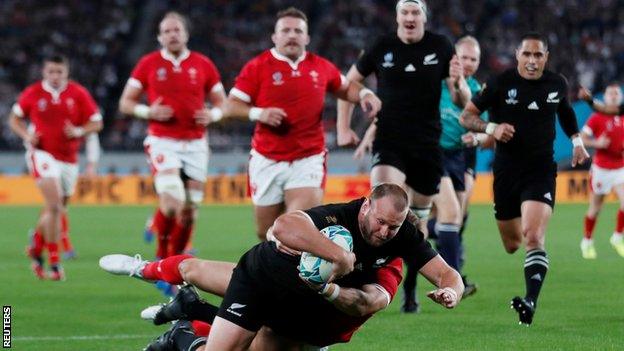Gareth Davies: WRU chairman sets out autumn contingency plans
- Published
Coronavirus: WRU chairman Gareth Davies reveals discussions over stadium future
Welsh Rugby Union chairman Gareth Davies says there are contingency plans being discussed for an alternative programme of autumn internationals.
Wales are due to host New Zealand, Argentina, South Africa and Fiji in Cardiff in November but those matches are in doubt because of coronavirus.
If those games were called off, matches against home nations or Six Nations sides are being considered.
"Every country is quite desperate to play in some form," Davies said.
Davies has reiterated he does not expect Wales' summer tour of New Zealand to go ahead but the All Blacks are still to confirm that news officially.
Wales are due to face New Zealand on 4 and 11 of July after travelling to Japan for a game on 27 June.
New Zealand have also said no decision has yet been made on whether their November trip - when they are due to play England and Scotland as well as Wales - will take place.
New Zealand is to become the first major rugby nation to return to action with Super Rugby teams playing a mini-series behind closed doors from 13 June.
WRU chief executive Martyn Phillips last week said the governing body could lose £50m if the autumn internationals or 2021 Six Nations home games cannot be played.
Wales are also looking to reorganise a postponed Six Nations match against Scotland that has been pencilled in for 31 October to complete the 2020 tournament.
"We've had no income into the business at all since February; therefore if we go for the rest of the calendar year with no income, it doesn't all bode well for the future," said Davies.
"Nobody knows what the future holds. Honestly, the best-case scenario is the autumn series takes place, as long as southern hemisphere countries are prepared and allowed to travel, which again is a key variable,
"The next scenario you look at is games against Six Nations teams before Christmas, or perhaps involving the four nations because again, travelling to the continent brings another set of unknowns into the equation, so there are options in place.
"The worst-case scenario is there's no rugby at all. The immediate consequence to that is the financial one, which affects all parts of the game."
Davies admitted playing matches behind closed doors would ensure a financial hit with £44.5m of the WRU group's £90m income last year coming from match income at the Principality Stadium.
"The likelihood is they'll be behind closed doors unless things improve remarkably quickly," said Davies.
"That will be a positive in the sense of television income, sponsorship income, but rugby is still very much reliant on gate receipts.
"We're talking 75,000 people who are paying variable amounts of money - it's a big hit for us, as it is for every union."

New Zealand defeated Wales 40-17 in the bronze medal match at the 2019 World Cup in Japan
Club survival
That financial issues will trickle down to the four regions and 320 clubs and districts. Davies has predicted most clubs will be sustainable for at least another six months.
"Our stated ambition at the start of this crisis was to bring all of our clubs with us and to meet everyone again on the other side," said Davies.
"We intend to be able to count the same number of clubs out, when the season starts once again, as we counted in at the beginning of March.
"We are creating a set of guidelines to cover all aspects of prospective return to play, based on, linked to and moving alongside government guidelines.
"We have also now received responses from more than 200 clubs to a survey which specifically targets sustainability during the current crisis. This information is vitally important to us as we continue to formulate plans to return to rugby.
"All the decisions we are taking on funding are geared towards support, maintenance and survival of our member clubs.
"We issued a payment to our clubs of £1,000 each in March from a hardship fund designed to help combat the effects of the current crisis.
"This was on top of specific funding to clubs which had been affected by the recent flooding issues after Storm Dennis, and our regular quarterly audit payment to clubs was made as normal at the end of April.
"Given these payments and external support from the Welsh government, the survey indicates that the majority of our clubs will continue to be sustainable for a minimum of six months."
Davies warned clubs not to live beyond their means.
"While our clubs have been widely impacted by Storm Dennis and the Covid-19 pandemic, for some their financial situation cannot be fully on account of these situations," said Davies.
"Some clubs have reported just one or two months of reserves available to them in April 2020 and this suggests a club living beyond its means.
"I don't make this point to criticise individuals or even specific clubs, but to point to the opportunity for us all to work together to ensure financial models throughout our game are sustainable and fit for purpose."
Davies admitted there were issues about players feeling safe in returning to play and that some fans could stay away from rugby because of the crisis.
"Do the professional players want to come back? It's a general question for the whole game," said Davies.
"Rugby clubs love it when the club (house) is teeming with supporters, eating, drinking, helping the club survive, but will that be the case?
"Will the older generation be nervous, will players have lost the habit of training and playing? Will professional players be nervous about exposing themselves to what will be a slightly unknown scenario, with no vaccine for this ailment? That is what we have to address."